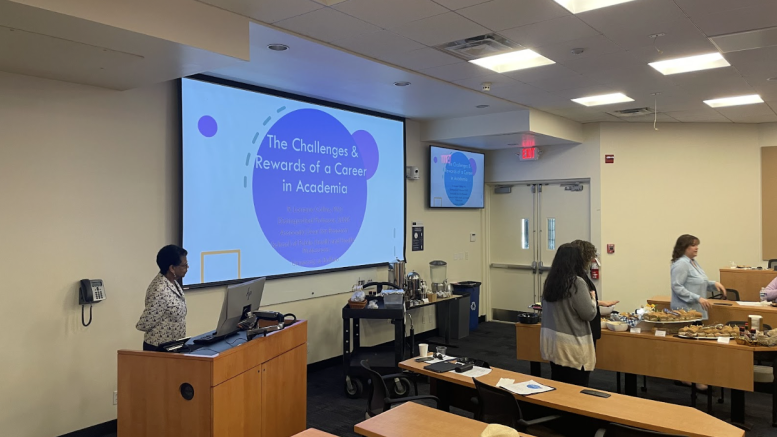Gabriela Danger | Assistant News Director
A career in academic research is something that many students interact with on a college campus, whether they consider it themselves or know others who do. On Apr. 15, R. Lorraine Collins came to FIU and gave a talk about the challenges and rewards of a career in academia.
Collins herself is an example of where an academic career can lead. She studied at McGill University for her bachelor’s degree and went on to study at Rutgers and the University of Washington for her master’s and post-doc, respectively.
She started her dissertation on interventions and behavioral research on obesity, which got her into studying the effects of alcohol and cannabis use on adults. Now, she specializes in the effects of cannabis.
Through all her time studying, mentoring, teaching, and volunteering, Collins has learned the many challenges as well as the rewards associated with her career path.
As far as the challenges go, it’s true that there are many. Collins talked about how some of the factors are personal— that is, things that vary from person to person. These are things anyone in academia can deal with, no matter their identity.
Impostor syndrome, feelings of inadequacy, or fear of success/failure are all things academics can go through. Some factors, however, are systemic. Women and people of color, as well as those experiencing intersectionality, certainly face more challenges in this career.
For example, there are many double standards that minority groups in academia face.
“I think a very important consideration is confidence, and whether your confidence as a researcher is perceived as being positive and healthy, or negative and arrogant. And the fact that women and people of color, when they exhibit confidence often are seen in a negative light. Is that news to anyone?” Collins said with a laugh.
However, what she described is the reality for many academics in this position. Hinging off this, Collins went on to discuss stereotype threat in the workplace, something that anybody with stereotypes against them can fall into.
Stereotype threat is the anxiety that arises when a certain stereotype is activated, and the person who falls under it knows about it and performs more poorly as a result.
Collins used the example of women and math. That is, give women a math test and mention that women are not as good at math, and then give the same test to another group of women, and don’t say that, just mention it’s a simple math test. The results come back showing that the women who were told they would do badly did indeed do badly, whereas the other ones were completely fine.
That is to say, they were aware of the stereotype, and it was reflected in the results.
According to Collins, this happens all the time to the more diverse faculty, staff, and students in universities. She emphasized the importance of good mentorship and so that universities can keep them on staff.
“We need supportive environments in academia, environments where there’s focus on recruiting and retaining diverse faculty members,” she said.
Although there are many challenges, Collins emphasized the many rewards that come from an academic career and why it is worth it to do.
“(When we) talk about the challenges of being in academia and the key components of building a successful career, we often think of research or teaching, but it’s a three-legged stool— research, teaching, and service,” she said.
To be an academic, you end up doing all three.
The first step is to find a topic that interests you and that you feel passionate about. Then seek out mentors, ask questions without hesitation, and find hands-on work to do. Volunteer in service projects or in labs concerning your topic, where applicable.
Always be prepared for your work and be ready to put in time and effort. At the bottom of the slide in red writing were the words “Read! Write! Think!”.
“So, I put ‘read, write, and think’ in red, because to me, that’s the backbone. That is what we’re about. And thinking is underrated. It’s the most important part of being a researcher,” Collins said.
She emphasized the importance of innovation in her field. Don’t just repeat the work of people before you. Expound upon it. Collins illustrated that point with a laugh, saying those who don’t innovate won’t get funding, earning a chuckle from the audience.
In being a researcher, you also have the opportunity to become a teacher or mentor yourself. Finding support and community within academia is another pivotal aspect of the career, according to Collins.
Always being open to new ideas, practicing and honing your skills constantly, and doing service are some of the most important parts of being an academic. Collins also mentioned time management and keeping time for rest. For her, it’s walking her dog, but it looks different for everyone.
So, for anyone considering a career in academic research, it’s not without its challenges. It is a life of constant learning, growing, and doing. But the rewards and community one can build are well worth it.
“I really enjoy what I’m doing, which is why I’m still doing it,” said Collins.
For more information, or to find another talk like this, visit @fiurcmi on Instagram.


Be the first to comment on "Seminar delves into understanding life in academia"